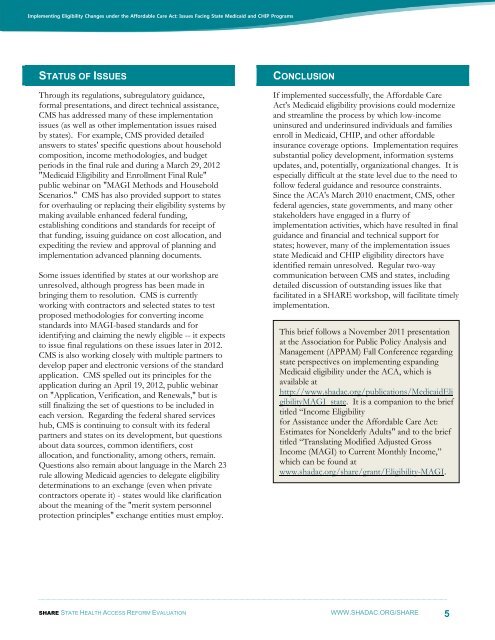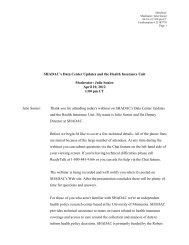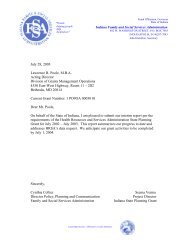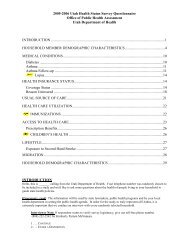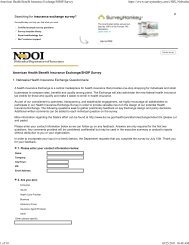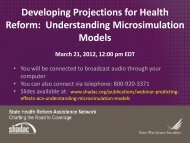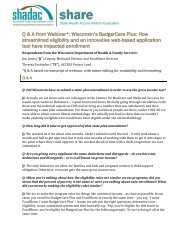Implementing Eligibility Changes under the Affordable ... - Shadac
Implementing Eligibility Changes under the Affordable ... - Shadac
Implementing Eligibility Changes under the Affordable ... - Shadac
You also want an ePaper? Increase the reach of your titles
YUMPU automatically turns print PDFs into web optimized ePapers that Google loves.
<strong>Implementing</strong> <strong>Eligibility</strong> <strong>Changes</strong> <strong>under</strong> <strong>the</strong> <strong>Affordable</strong> Care Act: Issues Facing State Medicaid and CHIP ProgramsSTATUS OF ISSUESThrough its regulations, subregulatory guidance,formal presentations, and direct technical assistance,CMS has addressed many of <strong>the</strong>se implementationissues (as well as o<strong>the</strong>r implementation issues raisedby states). For example, CMS provided detailedanswers to states' specific questions about householdcomposition, income methodologies, and budgetperiods in <strong>the</strong> final rule and during a March 29, 2012"Medicaid <strong>Eligibility</strong> and Enrollment Final Rule"public webinar on "MAGI Methods and HouseholdScenarios." CMS has also provided support to statesfor overhauling or replacing <strong>the</strong>ir eligibility systems bymaking available enhanced federal funding,establishing conditions and standards for receipt ofthat funding, issuing guidance on cost allocation, andexpediting <strong>the</strong> review and approval of planning andimplementation advanced planning documents.Some issues identified by states at our workshop areunresolved, although progress has been made inbringing <strong>the</strong>m to resolution. CMS is currentlyworking with contractors and selected states to testproposed methodologies for converting incomestandards into MAGI-based standards and foridentifying and claiming <strong>the</strong> newly eligible -- it expectsto issue final regulations on <strong>the</strong>se issues later in 2012.CMS is also working closely with multiple partners todevelop paper and electronic versions of <strong>the</strong> standardapplication. CMS spelled out its principles for <strong>the</strong>application during an April 19, 2012, public webinaron "Application, Verification, and Renewals," but isstill finalizing <strong>the</strong> set of questions to be included ineach version. Regarding <strong>the</strong> federal shared serviceshub, CMS is continuing to consult with its federalpartners and states on its development, but questionsabout data sources, common identifiers, costallocation, and functionality, among o<strong>the</strong>rs, remain.Questions also remain about language in <strong>the</strong> March 23rule allowing Medicaid agencies to delegate eligibilitydeterminations to an exchange (even when privatecontractors operate it) - states would like clarificationabout <strong>the</strong> meaning of <strong>the</strong> "merit system personnelprotection principles" exchange entities must employ.CONCLUSIONIf implemented successfully, <strong>the</strong> <strong>Affordable</strong> CareAct's Medicaid eligibility provisions could modernizeand streamline <strong>the</strong> process by which low-incomeuninsured and <strong>under</strong>insured individuals and familiesenroll in Medicaid, CHIP, and o<strong>the</strong>r affordableinsurance coverage options. Implementation requiressubstantial policy development, information systemsupdates, and, potentially, organizational changes. It isespecially difficult at <strong>the</strong> state level due to <strong>the</strong> need tofollow federal guidance and resource constraints.Since <strong>the</strong> ACA's March 2010 enactment, CMS, o<strong>the</strong>rfederal agencies, state governments, and many o<strong>the</strong>rstakeholders have engaged in a flurry ofimplementation activities, which have resulted in finalguidance and financial and technical support forstates; however, many of <strong>the</strong> implementation issuesstate Medicaid and CHIP eligibility directors haveidentified remain unresolved. Regular two-waycommunication between CMS and states, includingdetailed discussion of outstanding issues like thatfacilitated in a SHARE workshop, will facilitate timelyimplementation.This brief follows a November 2011 presentationat <strong>the</strong> Association for Public Policy Analysis andManagement (APPAM) Fall Conference regardingstate perspectives on implementing expandingMedicaid eligibility <strong>under</strong> <strong>the</strong> ACA, which isavailable athttp://www.shadac.org/publications/Medicaid<strong>Eligibility</strong>MAGI_state. It is a companion to <strong>the</strong> brieftitled “Income <strong>Eligibility</strong>for Assistance <strong>under</strong> <strong>the</strong> <strong>Affordable</strong> Care Act:Estimates for Nonelderly Adults" and to <strong>the</strong> brieftitled “Translating Modified Adjusted GrossIncome (MAGI) to Current Monthly Income,”which can be found atwww.shadac.org/share/grant/<strong>Eligibility</strong>-MAGI.SHARE STATE HEALTH ACCESS REFORM EVALUATION WWW.SHADAC.ORG/SHARE 5


